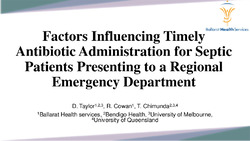Please use this identifier to cite or link to this item:
http://hdl.handle.net/11054/1309| Title: | Factors influencing timely antibiotic administration for septic patients presenting to a regional emergency department. |
| Author: | Taylor, Danielle Chimunda, Tim Cowan, Raquel |
| Issue Date: | 2018 |
| Conference Name: | Ballarat Health Services 2018 Annual Research Symposium: research partnerships for population, people and patients; celebrating our research partnerships with the community in the Grampians region |
| Conference Date: | November 29th |
| Conference Place: | Ballarat |
| Abstract: | Background Sepsis is an important healthcare issue due to its high mortality rate and cost to the healthcare system. In Australia, the incidence of adult severe sepsis is 7.7 per 10,000 people resulting in 11.8% of ICU admissions with an associated mortality rate of 20.9% in ICU and overall in-hospital rates between 27.6% to 37.5% Considering the evidence supporting early antibiotic treatment of sepsis and the poor outcomes seen in hospitals in rural and regional area, this project aims analyse the time to antibiotic delivery and factors that contribute to delayed antibiotic administration in one regional hospital in Victoria, Australia. Objectives/Aims The aim of this study is to quantify the time from triage to antibiotic delivery for patients with the provisional diagnosis of sepsis and septic shock presenting to an Emergency Department (ED) and determine the proportion of patients receiving antibiotics within 3 hours. To describe the factors associated with delays in the delivery of antibiotic therapy. Method Patients, over 18 years, admitted to the ED of a regional hospital in Victoria with a provisional diagnosis of sepsis in 2016 were included in this retrospective chart audit. Data collected by a single investigator. Univariate analysis was used to determine the time to antibiotic therapy as well as any factors that may limit the timeliness of treatment. Results There were 265 patients presenting to ED with the provisional diagnosis of sepsis in 2016 and 152 patients were included in the study. The median time to antibiotic administration from triage was 79 mins with 82.2% receiving antibiotics within three hours. Factors associated with longer time to antibiotics were: triage category; qSOFA (quick Sepsis Related Organ Failure Assessment); and nature of vital signs. Implications/Outcomes for Planned Research Project This project has increased the understanding of sepsis management in Australia, particularly in a regional setting. This project is limited by being a small single centre study, therefore a similar project should be undertaken in other Australian rural and metropolitan hospitals. Final Thoughts This study found that time to antibiotic delivery for patients with sepsis was mostly within the suggested 3·hour time frame . Patients seen with shorter delay were those with higher triage priority, higher sepsis severity scores and worse vital signs. |
| URI: | http://hdl.handle.net/11054/1309 |
| Internal ID Number: | 01262 |
| Health Subject: | SEPSIS SEPTIC EARLY ANTIBIOTIC TREATMENT |
| Type: | Conference Presentation |
| Appears in Collections: | Research Output |
Files in This Item:
| File | Description | Size | Format | |
|---|---|---|---|---|
| Danielle TAYLOR.pdf | ppt | 317.63 kB | Adobe PDF |  View/Open |
Items in DSpace are protected by copyright, with all rights reserved, unless otherwise indicated.
